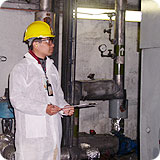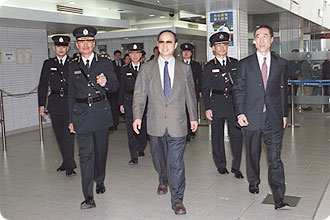 |
|
|
|
 |
|
 |
| |
Textiles Export Control
System
3. Under the WTO Agreement on Textiles
and Clothing, Hong Kong is obliged to ensure that exports
of textile products using Hong Kong quotas are manufactured
in the territory.
4. To ensure that Hong Kong fully discharges its obligations
under the Agreement, the department operates a comprehensive
programme of controls and enforcement measures, and
reviews regularly its strategies to meet the changing
circumstances in the trade. The department has been
adopting an intelligence-led strategy and a two-pronged
enforcement programme to tackle the problem of illegal
textile transshipment. Apart from the factory-based
pre-shipment and post-shipment checks, real time production
checks and factory audit checks, the programme regularises
the blitz check operations and strengthens the targeted
checks and investigations.
5. Blitz checks have been proven effective
in tackling illegal transshipments. The more intensive
use of intelligence and risk management in blitz check
operations has greatly enhanced the department's effectiveness
in combating illegal transshipment activities. In 2003,
the department examined 26 163 textile consignments
during 976 blitz check operations and detected 349 cases
of illegal textile transshipment with seizures worth
$54.2 million, representing an increase of 4.3 per cent
in the number of cases detected and a drop of 8.3 per
cent in the value of seizures as compared to 2002. Meanwhile,
820 persons/companies were prosecuted for various textiles-related
offences, resulting in the imposition of court fines
which amounted to $18.9 million and seizure of offending
textiles and clothing goods worth $127.1 million.
|
 |
 |
 |
 |
 An officer of Trade
Controls Branch conducting inspection at a
CD production factory.
An officer of Trade
Controls Branch conducting inspection at a
CD production factory. |
|
 |
 |
 |
 |
|
 |
 |
 |
 |
 |
 |
 An officer of the Trade
Inspection and Verification Bureau carrying
out a factory inspection and consignment check
in a plastic colorant factory.
An officer of the Trade
Inspection and Verification Bureau carrying
out a factory inspection and consignment check
in a plastic colorant factory. |
|
 |
 |
 |
 |
|
9.
In the HK/US Joint Factory Observation Visits conducted
in 2003, a total of 67 factories were visited. And in
April and October 2004, another two such visits were
conducted and a total of 98 factories were visited.
The visits were part of the continuous co-operation
programme under the Memorandum of Understanding signed
between the HKSAR Government and the US Government.
|
|
|
 |
|
 |
 |
|
 |
| |
Strategic
Trade Control System
10. To maintain a free flow of strategic commodities
for legitimate commercial and research use while at
the same time to prevent Hong Kong from being used as
a conduit for the proliferation of weapons of mass destruction,
the department, in collaboration with the Trade and
Industry Department, vigorously enforces the Strategic
Trade Control System to monitor the flow of strategic
commodities and to detect the provision of services
used for the development and production of weapons of
mass destruction.
11. The Chemical Weapons (Convention) Ordinance
which aims to fully implement the Chemical
Weapons Convention in Hong Kong came into operation
on 18 June 2004. The implementation of the Ordinance
underlines Hong Kong's commitment to internationally
agreed arrangements on the ban of chemical weapons and
on the monitoring of activities involving sensitive
chemicals. Through the enforcement of the Ordinance,
the department helps ensure Hong Kong's continued access
to the scheduled chemicals of the Convention for local
uses in industrial, medical, research and trading areas.
12. In combating illegal diversion of strategic commodities,
the department carries out licence checks to verify the
authenticity of information given in import and export
licence applications and disposal checks to ensure that
articles imported are used as declared. In 2003, the department
conducted 1 135 import licence checks, 1 404 export licence
checks and 470 disposal checks; investigated 251 cases;
and prosecuted 51 persons/companies resulting in a total
fine of $2.29 million. In these cases, the value of goods
involved was $23 million. In 2004, the department conducted
1 469 import licence checks, 2 249 export licence checks
and 403 disposal checks; investigated 234 cases and prosecuted
57 companies leading to a total fine of $151 million.
In these cases, the value of goods involved was $18 million.
|
| |
 |
|
|
 |
|
 |
 |
|
 |
| |
Import
and Export Declarations
14. The department administers and enforces the Import
and Export Declaration System. Any person who imports
or exports an article other than an exempted article
is required by law to submit a declaration within 14
days after importation or exportation and to pay a charge.
For exports of Hong Kong manufactured clothing and footwear
items specified in the Schedule to the Industrial
Training (Clothing Industry) Ordinance, an additional
clothing industry training levy has to be paid. The
department conducts checks to ensure that declarations
are submitted within the statutory time frame and contain
accurate information. Late lodgment of declarations
or lodgment of inaccurate declarations is liable to
prosecution and penalties.
15. In 2003, the department received 17.2 million declarations
and collected $938 million in import and export declaration
charges/clothing industry training levies/late penalty.
Short-paid declaration charges/clothing industry training
levies recovered and late/administrative penalties imposed
amounted to $14.9 million. In 2004, the department received
18.3 million declarations and collected $1 102 million
in import and export declaration charges/clothing industry
training levies/late penalty. Short-paid declaration
charges/clothing industry training levies recovered
and late/administrative penalties imposed amounted to
$17.1 million.
|
| |
 |
|
|
 |
|
 |
 |
|
 |
| |
 |
 |
 |
 |
 |
 The Vice-Minister of
Commerce, Mr An Min, was invited by the Financial
Secretary, Mr Henry Tang, to pay a visit to
Lok Ma Chau Control Point on 27 February 2004
to know more about the Hong Kong Customs’role
in the implementation of the Closer Economic
Partnership Arrangement (CEPA).
The Vice-Minister of
Commerce, Mr An Min, was invited by the Financial
Secretary, Mr Henry Tang, to pay a visit to
Lok Ma Chau Control Point on 27 February 2004
to know more about the Hong Kong Customs’role
in the implementation of the Closer Economic
Partnership Arrangement (CEPA). |
|
 |
 |
 |
 |
|
|
|
 |
|
 |
|
|

